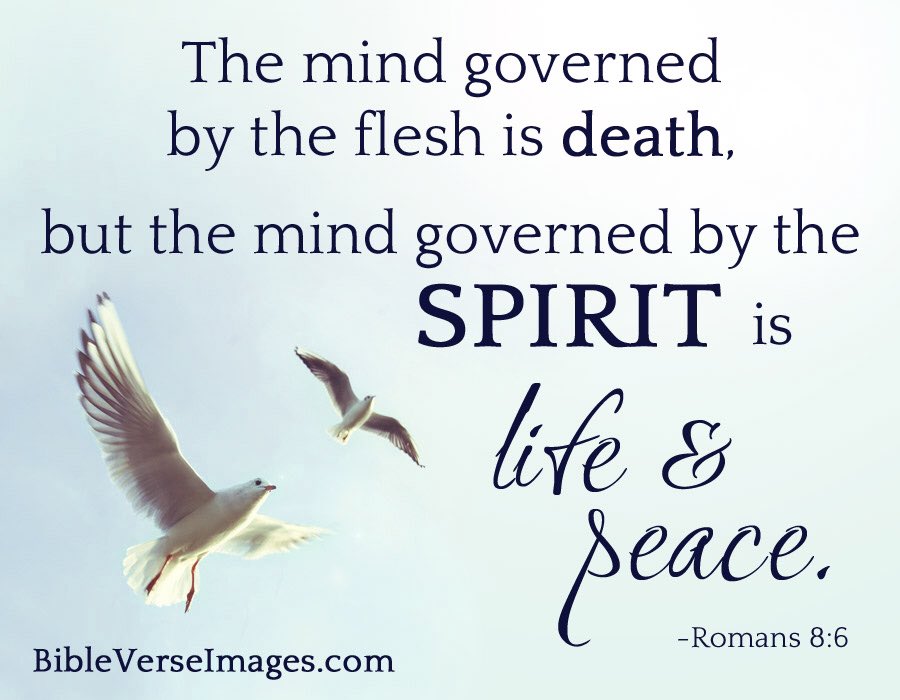THE SEED
For to be carnally minded is death; but to be spiritually minded is life and peace. Romans 8:6
Making decisions is a necessary part of life; even choosing not to decide is a decision. We have two perspectives on life, or two minds, as it were: the carnal mind; the mind of the flesh, and the mind governed by the sinful nature. Then there is the spiritual mind, which is the mind that is guided by the Holy Spirit and by God’s promise. We have undergone a drastic shift, as a result since we were all born as Esau, whose gut served as his deity. Christ-followers have to decide if they want to be carnally or spiritually minded. Carnal-mindedness is walking in the natural mentality, which can only result in misery, doubt, unbelief, and ultimately death. It involves thinking of temporary things, speaking from the heart, acting from the heart, and living according to the senses. Being spiritually-minded is having a mindset of the supernatural: having an eternal perspective, speaking by faith, acting in accordance with the Holy Scriptures, and living by the Holy Spirit; these things bring about peace, increased faith, believing, wealth, and life. We have undergone a transformation from a carnal to spiritual thinking, so that we might be confident in the joy of our salvation. And from that delight, we may draw strength to serve Him, kill sin, and advance. Since we are characterised by natural minds, we may be informed or cautioned that we are still under condemnation from that fruit, which bears the promise of eternal life.
PRAYER
O Lord, I pray for full transformation to a spiritually inclined thinking in assurance of salvation.
BIBLE READINGS: Romans 8:1-10
ṢIṢE IPINU
IRUGBIN NAA
Nitori ero ti ara iku ni, sugbon ero ti emi ni iye ati alaafia. Romu 8:6
Ṣiṣe ipinu je ohun pataki ni igbesi aye; paapaa yiyan lati ma ṣe ipinnu jẹ ipinnu. A ni awọn iwoye meji lori igbesi aye yi, tabi ọkan meji, ti n se: ọkan ti ara tio ni èrò ti ara, àti èrò inú tí ń darí nípa ifekufe ara. Lẹ́yìn náà, èrò inú ẹ̀mí wà, èyí tí a dari nipa Ẹ̀mí Mímọ́ àti nípase ìlérí Ọlọ́run. A ti ni ìyípadà ǹlà kan, nigba ti oje pe gbogbo wa la bi si aye bi ti Esau ti o fi ikun re se Olorun re. Omọlẹ́yìn Kristi ní láti pinnu bí wọ́n bá fẹ́ jẹ́ ti ara tàbí ti ẹ̀mí. Ero ara ni rinrin nipa ti eran ara, èyí tí ó lè yọrí sí ìbànújẹ́, iyèméjì, àìnígbàgbọ́, àti ikú. Ó ni se pelu ero ohun igba die, sísọ̀ orọ̀ ati iwa láti inú ọkàn pelu igbesi aye ní ìbámu pẹ̀lú agbára ìmòye. Ero ti orun ni ki eniyan ma ro ohun ti ijinle: níní ojú ìwòye ayérayé, sísọ̀rọ̀ nípa ìgbàgbọ́, ṣíṣe ní ìbámu pẹ̀lú Ìwé Mímọ́, àti gbígbé nípasẹ̀ Ẹ̀mí Mímọ́; nǹkan wọ̀nyí ń mú àlàáfíà wá, ìgbàgbọ́ tí ó pọ̀ sí i, ọrọ̀, àti ìyè. A ti yí wa padà láti ero ara sí ti ẹ̀mí, kí a lè ní ìgbọoya nínú ayọ̀ ìgbàlà wa. Ki a le ni agbara lati sin nipa se eyi, pa ẹṣẹ run, ki o si tesiwaju. Níwọ̀n igba ti a da wa pelu ero abinibi wa, o se se ki a ni ero pe awà lábẹ́ ìdálẹ́bi láti inú èso na, èyí tí ó mú ìlérí ìyè ayérayé dani.
ADURA
Oluwa, Mo gbadura fun iyipada kikun kin le ma ro ohun ti ẹmi ni idaniloju igbala. Amin.
BIBELI KIKA: Róòmù 8:1-10
